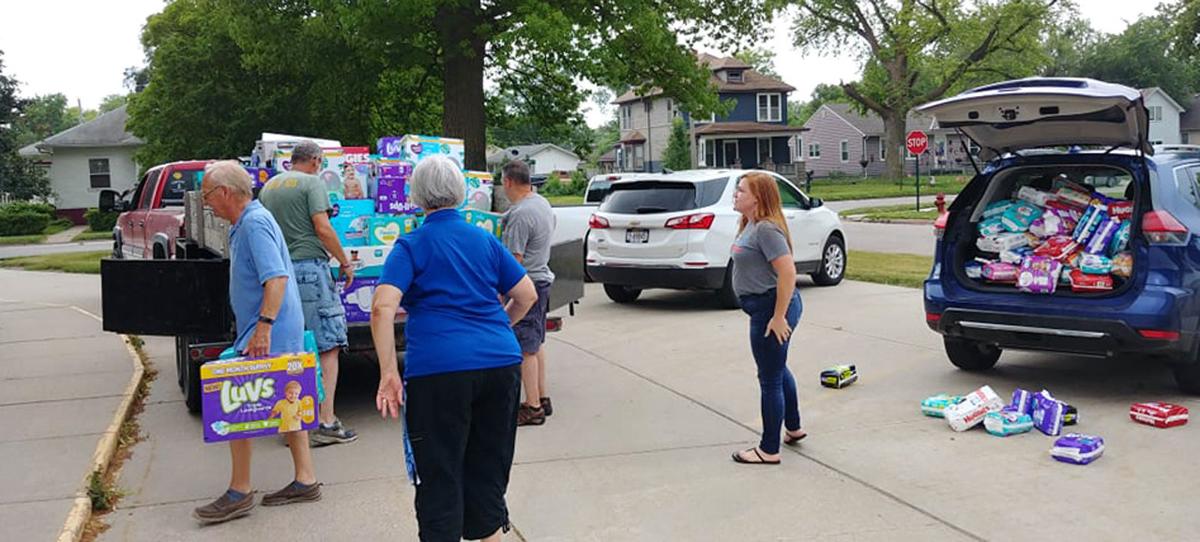
Michelle Old, executive director of the Durham-based Diaper Bank of North Carolina and her small staff of three people went into overdrive in March when the COVID-19 pandemic hit to get diapers, period products and adult incontinence supplies to those in need.
They faced a two-pronged battle. Help and supplies were limited. No longer could they let dozens of volunteers into their warehouse each week to package the items they distribute. No longer were local churches and other groups holding local drives for diapers or tampons, an important source of products, because they were no longer meeting in person. Community collection points were closed. And some of the agencies that they worked with to distribute diapers to those who needed them shut down.
At the same time, the need grew exponentially as job losses and hunger surged. "One hundred percent of the time, if they are struggling for food, they are struggling to get diapers and hygiene products," said Old, a mom of three who founded the diaper bank in January 2013. "And every single time, a family will choose to feed their children and try to make those diapers last as long as they can."
Along with grants from local groups and agencies, the small team has had to rely in large part on itself, finding new ways to distribute the hygiene items to those who need them. Compared to pre-COVID days, the diaper bank has distributed 400% more diapers, 800% more period products and 2,000% more adult incontinence supplies.
"I've never been prouder," Old said of her team. "Every single one is a mother or grandparent that is also dealing with remote learning with their kids at the exact same time. We did not miss a beat. We were steadfast. We made sure that every single order was filled. That we met the need. We never stopped. Not once."
Working, military families go without
As hunger rates climbed across the country, food distribution has gotten a lot of attention during the pandemic, and for good reason. But diapers, period products and adult incontinence items are also critical for day-to-day living. Federal programs such as WIC and SNAP, however, don't cover the cost. And food banks often don't have them on hand.
The majority of the diaper bank's clients are working families, Old said. Pre-COVID, 78% of families it distributed items to were working one to three jobs and still could not afford basic needs, she said. These include teachers and military families. For some time, the nonprofit has delivered items directly to Fort Bragg. According to a study the diaper bank conducted, 63% of military families can't afford diapers every month.
"We hear from military families where one spouse is deployed and the other is at home and they qualify for WIC and food stamps and can't afford diapers," she said. "We hear from teachers who are teaching children during the day and go home at night and can't afford diapers for their own children."
As job losses stacked up, among retail workers, restaurant workers and many others, the need only grew, Old said. "A lot of these families working hourly two or three jobs, those are gone," she said. "The need is just beyond anything that we have ever experienced."
Banding together
What's driving Old are the stories that she hears because she knows she can help. The babies suffering from severe diaper rash because parents can afford to only put them in a single diaper during the day. Girls and women without tampons and pads who use socks or napkins or nothing. Older adults who don't leave their homes because of incontinence.
When it comes to diapers, for example, the families the diaper serves can't afford to buy $40 boxes of diapers and often don't have the transportation to get to a warehouse store, she said. Instead, they try to make do with the overpriced diapers found at small convenience stores and corner markets. There, diapers, which can be found for about 17 cents a piece at a big box store, are as expensive as $1.40 per diaper in some neighborhoods, Old said.
"It's much more expensive to be poor," she said. "The access is limited, and you're working twice as hard just to make ends meet. This really is a social justice issue."
As the pandemic continues, Old is hopeful. They've started bringing in volunteers again, who package items outside and socially distanced from each other. There also are opportunities to volunteer at home.
And the diaper bank could always use more supplies. Cash donations go the furthest because the nonprofit has partnership with diaper manufacturers and can purchase them more cheaply. It always needs pads, adult pull ups in larger sizes and size 5 diapers.
More information about how to help is on the Diaper Bank's website. You also can email info@ncdiaperbank.org to find out more.
Old said she's thankful for her staff and for community partners that have helped the diaper bank navigate these challenging times.
"It was difficult," Old said. "But we all just kind of banded together to do what we do. I'm so proud of everyone."
Go Ask Mom features local moms every Monday.
The Link LonkJanuary 25, 2021 at 09:10AM
https://ift.tt/2NtNT0t
Diaper Bank of North Carolina sees needs grow exponentially during COVID - WRAL.com
https://ift.tt/2Comt7j
Diapers

No comments:
Post a Comment